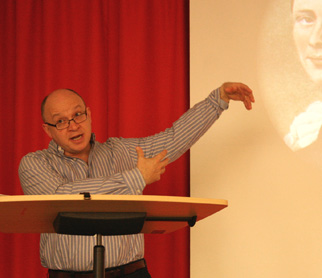
On Wednesday 14 May, Sean Allan from Warwick University gave a comprehensive introductory lecture to Michael Kohlhaas and to the background of its author, Heinrich Wilhelm von Kleist. Pointing out the paradoxical subtleties within the character of Kohlhaas, Sean Allan warned against one-sided readings of the novella’s plot, which regard the character as either a madman or a hero.
The story evolves around the horse dealer Michael Kohlhaaswho is mistreated by the Junker Wenzel von Tronka. When Kohlhaas sues Tronka, Tronka’s family ties protect him, forcing Kohlhaas to seek justice higher up on the legal ladder. But everywhere Kohlhaas is faced with similar corruption, until he sells his land and takes up violence to obtain justice. The novella was written in 1811 by Kleist, a controversial and often misunderstood German writer. As Allan explained, Kleist is perceived in different ways: as a Prussian nationalist, a romantic idealist, or a radical intellectual. This complexity of character enabled groups to appropriate Kleist, including the Nazi party and Communist groups. As well as the Reformation and the French Revolution, the philosophy of Immanuel Kant was a major influence on Kleist. In particular, Kant’s Enlightenment ideals of basing morality solely on the individual’s use of reason and good will (instead of on moral sentiment, or on a calculation of consequences) seem to find expression in the character of Kohlhaas. After situating the text in Kleist’s biography and oeuvre, Allan went on to examine its substance.
Although Kohlhaas is radical in his pursuit of justice, Allan was keen to point out that the narrator informs us that Kohlhaas has ‘a realistic sense of the imperfection inherent in the order of the world’. In his own way, Kohlhaas is reasonable; he just wants recompense for his mistreatment. Yet he resorts to measures which may be considered unreasonable (plundering the villages of the Saxony bureaucrats, for example) in pursuit of this reasonable end. Kohlhaas seems to be aware of this, reflecting aloud that perhaps he has made sacrifices disproportionate to his cause. It is often neglected that Kohlhaas seems to be aware of his actions and always takes full responsibility for them. Allan linked the escalation of violence in Kolhaas to social contract theory: as Kohlhaas’ rights are not defended he is cast out from the community, entering into a ‘state of war’. Kohlhaas is not an anarchist and never aims to overthrow the State; he simply claims the right to justice, which, under the social contract, the State promises him. It is this motive which explains how Kohlhaas can succeed in his violent rampage: whereas it is relatively easy to contain mad aggressors, it is difficult for the corrupt Saxony to suppress Kohlhaas’ claim to justice.
Just as we should be careful about ascribing specific beliefs and intentions to Kleist, we ought to resist the temptation to reduce Kohlhaas to the categories of mad villain or justified hero. Allan’s lecture drew our attention to the human elements of Kohlhaas’ torment – the righteousness and reasonableness that accompany his radical tendencies.
Dr. Sean Allan is Associate Professor (Senior Lecturer) in German Studies at Warwick University, focusing on German literature of the late eighteenth and early nineteenth centuries and on German cinema. He is the author of The Stories of Heinrich von Kleist: Fictions of Security (Rochester, NY: Camden House, 2001); The Plays of Heinrich von Kleist: Ideals and Illusions (Cambridge: CUP, 1996); and DEFA: East German Cinema 1946-92 (co-edited with John Sandford), (Oxford: Berghahn, 1999).
Article by Martin Lipman (’08, Netherlands)
